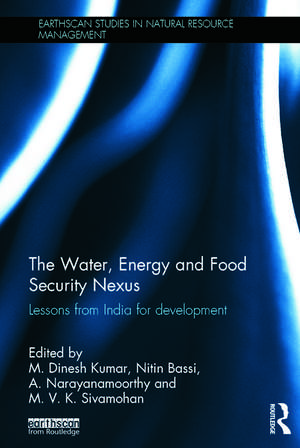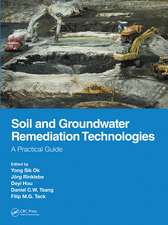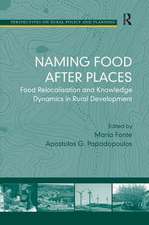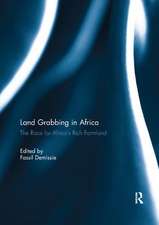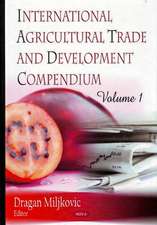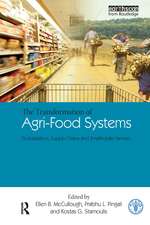The Water, Energy and Food Security Nexus: Lessons from India for Development: Earthscan Studies in Natural Resource Management
Editat de M. Dinesh Kumar, Nitin Bassi, A. Narayanamoorthy, M.V.K. Sivamohanen Limba Engleză Hardback – 18 feb 2014
In this book, the authors show how these issues are being addressed in India as part of its economic development, and how these can provide lessons for other developing nations. They address the conflicting claims of water resources for irrigation and hydropower, where both are scarce at the national level for fostering water and energy security. They also consider the relationship between water for irrigated agriculture and household use and its impact on rural poverty. They identify weaknesses in the current hydropower development programme in India that are preventing it from being an ecologically sustainable, socially just and economically viable solution to meeting growing energy demand.
The empirical analyses presented show the enormous scope for co-management of water, energy, agricultural growth and food security through appropriate technological interventions and market instruments.
| Toate formatele și edițiile | Preț | Express |
|---|---|---|
| Paperback (1) | 325.34 lei 6-8 săpt. | |
| Taylor & Francis – 12 oct 2017 | 325.34 lei 6-8 săpt. | |
| Hardback (1) | 848.15 lei 6-8 săpt. | |
| Taylor & Francis – 18 feb 2014 | 848.15 lei 6-8 săpt. |
Din seria Earthscan Studies in Natural Resource Management
-
 Preț: 312.94 lei
Preț: 312.94 lei -
 Preț: 311.41 lei
Preț: 311.41 lei -
 Preț: 300.00 lei
Preț: 300.00 lei -
 Preț: 295.19 lei
Preț: 295.19 lei -
 Preț: 310.51 lei
Preț: 310.51 lei - 9%
 Preț: 868.82 lei
Preț: 868.82 lei - 18%
 Preț: 1000.27 lei
Preț: 1000.27 lei -
 Preț: 442.50 lei
Preț: 442.50 lei -
 Preț: 388.85 lei
Preț: 388.85 lei -
 Preț: 469.34 lei
Preț: 469.34 lei - 16%
 Preț: 222.32 lei
Preț: 222.32 lei -
 Preț: 323.23 lei
Preț: 323.23 lei -
 Preț: 416.22 lei
Preț: 416.22 lei - 19%
 Preț: 271.58 lei
Preț: 271.58 lei -
 Preț: 456.50 lei
Preț: 456.50 lei -
 Preț: 445.56 lei
Preț: 445.56 lei - 26%
 Preț: 764.36 lei
Preț: 764.36 lei - 12%
 Preț: 325.34 lei
Preț: 325.34 lei -
 Preț: 389.66 lei
Preț: 389.66 lei - 18%
 Preț: 1001.07 lei
Preț: 1001.07 lei - 18%
 Preț: 1000.27 lei
Preț: 1000.27 lei - 18%
 Preț: 189.09 lei
Preț: 189.09 lei -
 Preț: 416.22 lei
Preț: 416.22 lei - 18%
 Preț: 1117.88 lei
Preț: 1117.88 lei - 26%
 Preț: 764.20 lei
Preț: 764.20 lei - 26%
 Preț: 764.20 lei
Preț: 764.20 lei - 18%
 Preț: 1000.27 lei
Preț: 1000.27 lei - 49%
 Preț: 544.75 lei
Preț: 544.75 lei - 18%
 Preț: 999.82 lei
Preț: 999.82 lei -
 Preț: 389.66 lei
Preț: 389.66 lei - 18%
 Preț: 1009.55 lei
Preț: 1009.55 lei - 18%
 Preț: 1013.52 lei
Preț: 1013.52 lei - 18%
 Preț: 1009.55 lei
Preț: 1009.55 lei -
 Preț: 415.67 lei
Preț: 415.67 lei
Preț: 848.15 lei
Preț vechi: 1140.70 lei
-26% Nou
Puncte Express: 1272
Preț estimativ în valută:
162.30€ • 169.79$ • 134.82£
162.30€ • 169.79$ • 134.82£
Carte tipărită la comandă
Livrare economică 03-17 aprilie
Preluare comenzi: 021 569.72.76
Specificații
ISBN-13: 9780415733038
ISBN-10: 0415733030
Pagini: 246
Ilustrații: 31 b/w images and 40 tables
Dimensiuni: 156 x 234 x 20 mm
Greutate: 0.48 kg
Ediția:New.
Editura: Taylor & Francis
Colecția Routledge
Seria Earthscan Studies in Natural Resource Management
Locul publicării:Oxford, United Kingdom
ISBN-10: 0415733030
Pagini: 246
Ilustrații: 31 b/w images and 40 tables
Dimensiuni: 156 x 234 x 20 mm
Greutate: 0.48 kg
Ediția:New.
Editura: Taylor & Francis
Colecția Routledge
Seria Earthscan Studies in Natural Resource Management
Locul publicării:Oxford, United Kingdom
Public țintă
PostgraduateCuprins
1. Water-Food-Energy Nexus: Global and Local Perspectives 2. Unraveling Gujarat’s Agricultural Growth Story 3. Ghost Workers and Invisible Dams: Checking the Validity of Claims about Impacts of NREGA 4. Benefit Sharing Mechanism for Hydropower Projects-Pointers for North East India 5. Is Irrigation Development Still Relevant in Reducing Rural Poverty in India?: An Analysis of Macro Level Data 6. Raising Agricultural Productivity with Reduced Use of Energy and Groundwater: Role of Market Instruments and Technology 7. Diesel Price Hikes and Farm Distress in the Fossil Fuel Dependent Agricultural Economy Myth and Reality 8. Breaking the Agrarian Impasse in Eastern India 9. Developing a Household Level MUWS Vulnerability Index for Rural Areas 10. The Decade of Sector Reforms of Rural Water Supply in Maharashtra 11. Future Impacts of Agri-business Corporations on Global Food and Water Security 12. Of Statecraft: Managing Water, Energy and Food for Long-term National Security
Recenzii
"Because this book provides such an interdisciplinary view of how a sustainable food system depends on responsible policies and management of water, energy and other inputs, it will be useful to people from many walks of life; including students, academics, policy makers, consultants, and industry. It is a book that can be read cover to cover or used as a reference for many critical food security topics related to water, energy and a host of issues that link the two." – Prof. Michael Faiver Walter, Cornell University, USA
Descriere
In this book, the authors show how the "nexus" of water management, agriculture, food security and energy as the optimal approach to sustainable development is being addressed in India as part of its economic development, and how this can provide lessons for other developing nations.
